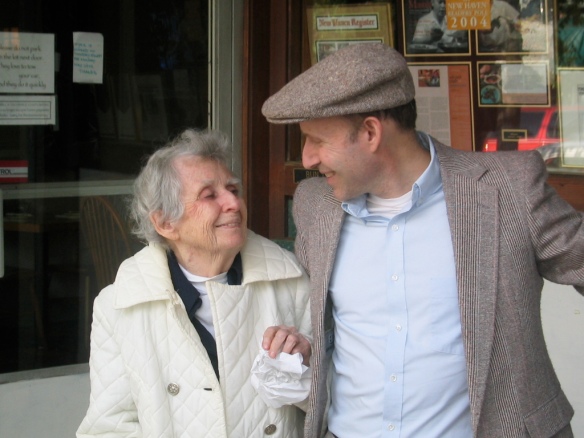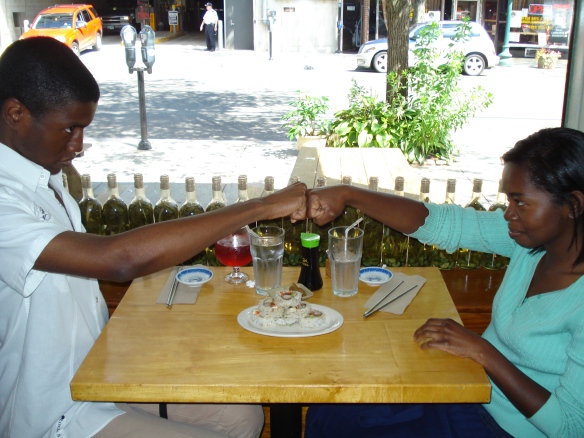Bun,
Great being with you last night, permitted to put the pedal to the floor. Of course there’s much more.
I urge you to think more about that first act of Biblical eating. The fruit (not an apple) is described in Genesis Chapter 3 as “good for eating, a delight to the eyes, …a desirable source of wisdom.” The snake said to the woman, “You are not going to die but God knows that as soon as you eat of it your eyes will be opened, you will be like God, knowers of good and bad.”
That food is eaten by the eyes, that the eyes make initial contact with the morsel, this of course you know better than I. But that in eating we seek wisdom and discrimination even as we fear or face dying, this is perhaps less familiar a way to think about ingesting. In eating we seek to become like God. Through eating we discover our naked humanity and simultaneously our link to deity.
This last observation is captured I think in the Hebrew blessing mandated by the Talmud to be recited AFTER eating virtually anything, beginning with a glass of water or any juice, save grape juice or wine. “You are the Source of Blessing, Creator of myriad souls and of their neediness that weighs upon all that You created in order to revive through them the soul of each life.” A little ponderous but thus it is, more or less. Eating allows an experience of resurrection, of near-death and re-birth. Naked we are born and naked we die. Or as Job put it, “Naked came I out of my mother’s womb and naked shall I return there.”
In eating we meet God and lose God, eat God, as it were, become God (as in “You are what you eat.”) and lose God (as in “You can’t eat your cake and have it too.”) In eating we become naked babes, nursling, sucking at the breast of life. Babes are innocent but in adult eating there is always a dimension of the forbidden, a guilt that we must destroy, kill, mash, sunder, mutilate in order to survive. The guilt over eating precedes the guilt over sex, but it is the same guilt. It is the belief that we are not lovers but rather greedy, hungry murderers. The blessing cited above tries, I think, to remove the toxin of guilt from the experience of appetite and satisfaction, to remove the shame that enters Eve’s and Adam’s mind after eating that fruit.
The Talmud, by the way, reckons that different foods require different blessings. Both before and after eating. This category of law may be worth pursuing further. Thus before a glass of water one says, “You are the Source of blessing through whose word everything comes to be.” Eating then is like speaking. One thinks of the magnificent opening to the Gospel of John: “In the beginning was the word, and the word was with God, and the word was God. He was in the beginning, with God. Everything came about through him, and without him not one thing came about. What came about in him was life, and the life was the light of mankind; and the light shines in the darkness, and the darkness did not understand it.”
The miracle of mouth, organ of ingestion, kissing, biting, eating and speaking. We speak light and we eat light.
Before bread, You are the Source of Blessing who makes bread come forth from the earth.
Before wine and grape juice, You are the Source of Blessing, creator of the fruit of the vine.
After bread a massive blessing that has grown over the centuries. The notion of blessing after you eat is already in the Bible, in Deuteronomy 8: 7 – 10, the fifth of the five books, say a 7th century BC work, which, referencing the seven species, says, “For the Lord your God is bringing you into a good land, a land with streams and springs and fountains issuing from plain and hill; a land of wheat and barley, of vines, figs and pomegranates, a land of olive trees and honey; a land where you may eat food without stint, where you will lack nothing; a land whose rocks are iron and from whose hills you can mine copper. You shall eat and be satisfied and then bless the Lord your God for the good land he has given you.”
The notion of satisfaction as the precondition for making a blessing is Biblical. In the Bible one becomes capable of offering blessing on the full stomach, for blessing emerges from the experience of abundance. The Talmud tries to inculcate the notion of being satisfied with a little and thus teaches the obligation to bless even if you have only consumed “an olive’s worth” of food. It also introduces the obligation to bless prior to eating, suggesting that one who eats without first blessing is a thief. The world is the Lord’s and the fullness thereof. The blessing turns booty into gift, forbidden into permitted, consumption into offering. The role of word in the context of eating. The role of eating in the context of word. Animal sacrifice in the Temple was also an attempt to propitiate blood guilt.
The Rolling Stones taught the troubling truth that “I can’t get no satisfaction.” Satisfaction is indeed the great gift. But so too is hunger, desire, yearning. Compare “Blessed are you who hunger now, because your hunger shall be satisfied.” from Luke. In The Hebrew Bible you can be “satisfied of days” like Abraham, Isaac and Job. Achieving satisfaction, the experience of enough, sufficiency, adequacy is spiritually important. To go beyond neediness, like Siddharta as rendered by Hesse who says, “I can wait, I can meditate and I can fast.”
Which leads us to fasting, binging, purging. And all the curiosities of kashrut. But that perhaps for another time.
Wonderful thinking this stuff through with you. Food for thought.
Rabbi James E. Ponet
Howard M. Holtzmann Jewish Chaplain
Joseph Slifka Center for Jewish life at Yale

An Easter gift from Dawn









